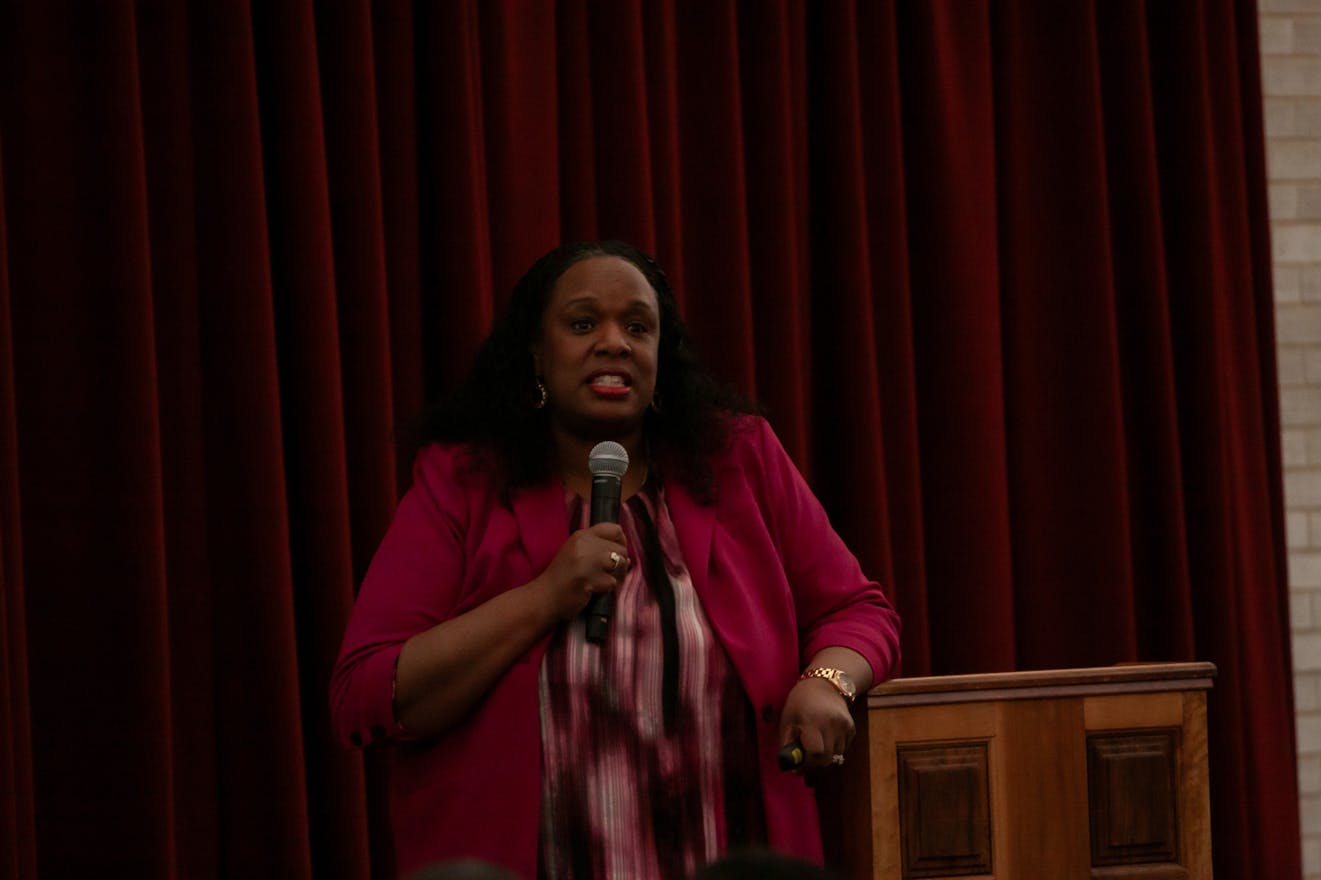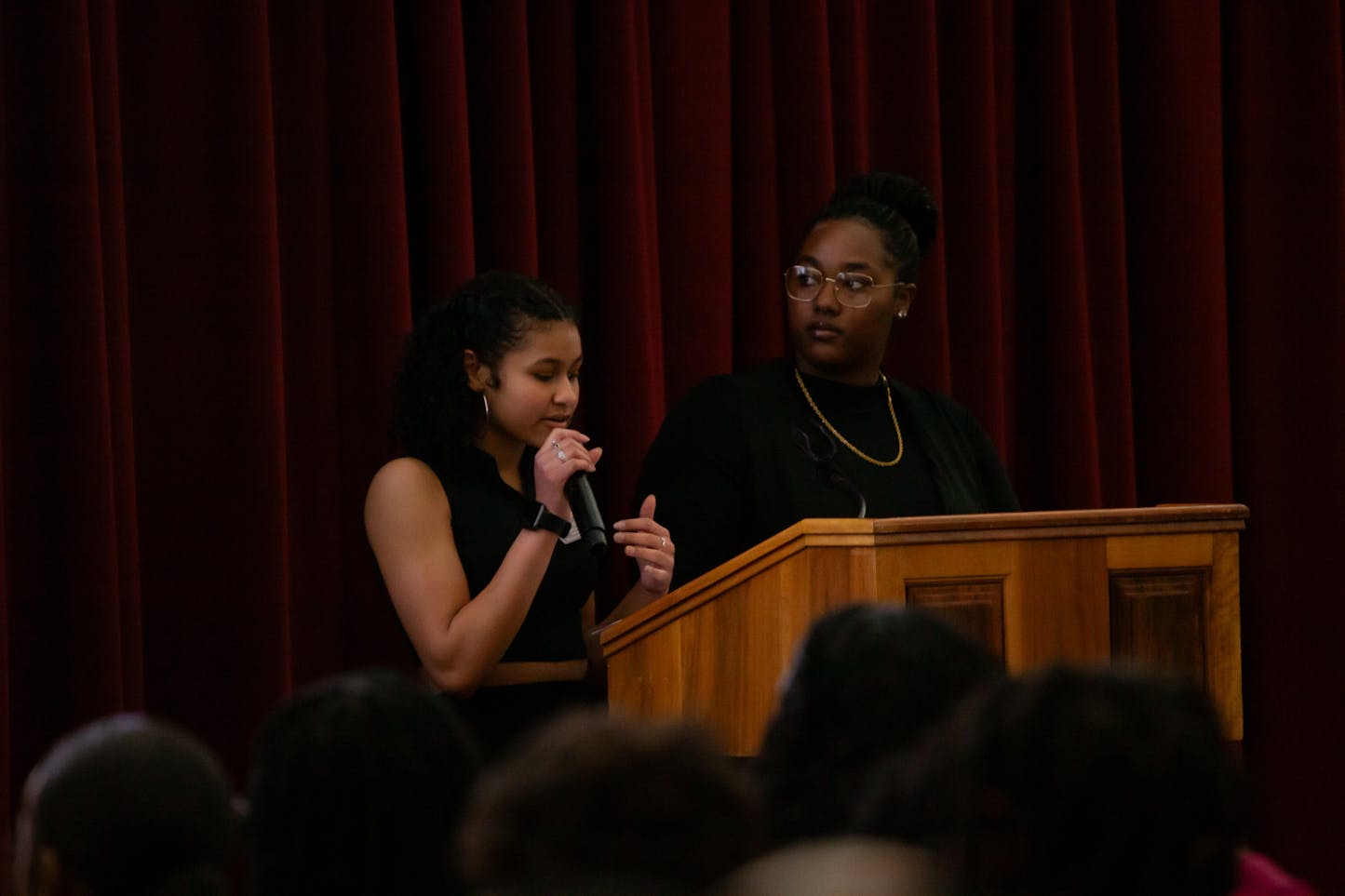‘Our hair is our crown’
Black Care Starts Somewhere annual event discusses topics of Black hair and skin care along with mental health and how to have a growth mindset.

Central Michigan University students listen to Dr. Delicia Pruitt's presentation on BG Magic in the UC Rotunda on Friday, Feb. 21, 2025. (CM Life | Jasmine Brookins)
The Black Care Starts Somewhere event, sponsored by the Residence Housing Association (RHA), took place on Feb. 21 in the Rotunda of the Bovee University Center. The event started discussion about the care of skin, hair and mental health.
The Black Care Starts Somewhere executive board requested and received a budget of $10,000 for products from the RHA to give away at this event. Products were bought from Bantu Beauty Supply in Lansing.
Emily Hansard is a senior studying psychology and sociology. She is also on the executive board for the Black Care Starts Somewhere event. She said the event was started in 2022 by Makalya Osborn due to the absence of beauty supplies stores in Mount Pleasant.
“When Makayla realized that there’s no beauty supply stores, many people in the Black community had to either go home to get products or order online,” Hansard said. “The event is to provide resources and information on how to care for your hair, skin, mouth and physical health.”
Hansard said this is a very important and uplifting event, especially in the area because historically, Mount Pleasant is not the most welcoming place for Black students, on and off campus.
“The core mission of Black Care Starts Somewhere is to provide a way to strengthen the Black community,” Hansard said. “It’s a great way to make the Black community feel loved, seen, heard and validated.”
Hansard said she wants to see people walk out feeling more educated on how to care for themselves.
Brianna Pruitt is a senior studying biomedical science and was at the forefront of organizing this event as a member of the executive board.
“We are teaching minority groups and other people how to be an ally for those in the Black community and how to be a support system,” Pruitt said.
Mental health
The event kicked off with a presentation about mental health from speaker Dr. Delicia Pruitt, the medical director of the Saginaw County Public Health Department. She spoke about the importance of the ‘hero’s journey’, self-compassion and a growth mindset.
“You may start living a normal life, then something happens and you get a call to adventure and dare I say, that call to adventure for you guys is you’re in college,” she said. “Sooner or later, we come in contact with an enemy, a test, some kind of trial.”
She said you may question yourself and your abilities to get through this trial, but no matter what you can get up, face the supreme ordeal and seize the sword.
“It’s not about when you finish, it’s if you finish,” Pruitt said. "Get up."

Dr. Delicia Pruitt gives a presentation on BG Magic and the different ways to take care of yourself, whether it's mentally or physically, in the UC Rotunda on Friday, Feb. 21, 2025. (CM Life | Jasmine Brookins)
Pruitt also spoke about self compassion and how it impacts your ‘hero journey’.
“One of the things we have to do on our hero journey is to have self compassion,” she said. “It’s important to have great self esteem … but self compassion is how we treat ourselves.”
Pruitt said when we are nice to ourselves, it makes room for a growth mindset.
“The growth mindset says failure is an opportunity to grow," she said. "I can learn anything I want and that challenges help me grow."
Pruitt ended her presentation with a prescription for the audience.
“Have peace to accept the things that you cannot change, have the courage to change the things that you can change and gain wisdom to know the difference,” she said.
Black Skin care
Madison Coleman and Hansard also talked about the importance of healthy and unique skin care needs of melanated skin along with the lack of representation in dermatology textbooks. Melanin is a substance in the body that produces hair and skin pigmentation.
“Our unique skin tones aren’t a matter of having melanin or not,” Coleman said. “But as a result of the amount, type, size and distribution of melanin our bodies are genetically predisposed to produce.”
Melanin in skin provides many biological benefits such as protection against the damage from UV light, Hansard said. Although melanin protects your skin from UV lights, Hansard said, it's important that you make sure to put on sunscreen.
“While Black people are more likely to have high levels of melanin in their skin, people from other races and ethnicities may have many of the same skincare needs as others,” Hansard said.
Hansard said there is a big issue within dermatology and the education of skin conditions on Black skin.
“Many medical professionals do not get trained on the way that different skin conditions appear on people of color,” she said. “The specialty is focused on images for their treatment and diagnosis, but many textbooks do not include melanated skin within its curriculum, which often leads to incorrect diagnosis.”
The American Academy of Dermatology Association has tips on their website to help with skin care specifically for individuals with darker skin tones.
Hansard said an important principle when caring for melanated skin is to be consistent with your skincare routine.
“It’s important to opt for something that is simple and manageable,” she said. “It may take some trial and error to figure out what works best for you as everyone’s skin is different and has different needs.”
Coleman ended the presentation by giving four essential steps to a skincare routine:
- Cleansing: Gets rid of dirt and oils
- Treatment: Helps with pH balance
- Moisturizer: Makes sure your skin stays hydrated, soft and less irritated
- Sunscreen: Protects your skin from UV rays
Black Hair care
Brianna Pruitt and Marayla Cross spoke on hair care, its history and how to protect it from damage.
Cross spoke about the history of Black hair in the U.S, which she said goes back to the 17th century.
“From the 1600s to 1700s, there was a lot of forcing to shave hair during the Trans Atlantic slave trade,” Cross said. “However, there were signs of resistance during slavery as they would use their hair for maps to escape routes and hidden food.”

Central Michigan University students give a presentation on Black hair care and historical markers in the industry in the UC Rotunda on Friday, Feb. 21, 2025. (CM Life | Jasmine Brookins)
Pruitt then discussed the Crown Act which is the act that stops companies from discriminating against women of color due to their natural hair.
A map was shown to the audience showing that as of today, 23 out of 50 states have accepted the Crown Act.
“Even though this act is in place, discrimination has not stopped,” she said.
Over time, Black hair care has become a symbol of identity, Cross said.
“It’s a call for resistance and freedom of expression as well as its creative bonds with others and ourselves through our own personal hair care journey,” Cross said. “And in the words of Christiano Bermúdez, ‘Our hair is our crown, so let’s treat it as so’.”
Some hair care tips given at the event were:
- Sleeping with bonnets and silk pillowcases to prevent damage
- Some hairstyles aren’t meant for everyone. If it hurts, it may damage the hair and lead to breakage
- Washing hair every one to two weeks
- Deep condition once a month
- Avoid heating or using a blow dryer, instead use a cotton t-shirt.
Cross also spoke about the do’s and don’ts, specifically microaggressions of Black hair.
“If you are othering other people, that is a form of microaggression,” Cross said. “An example of this is asking if it’s their real hair or how long their real hair is.”
“On the other end, if you’re uplifting and being very kind to people's hair, it means you're complimenting them,” she said. “Just making sure you're reflecting on what you’re saying to other people is a great way to understand that.”
Hair, skin and hygiene products were handed out at the end of the presentations. Some of the products included were:
- Hair sprays
- Gels/edge control
- Shampoo and conditioner
- Oils
- Loc products
- Braiding and crocheting hair
- Cleansers
- Lip gloss
- Exfoliating gloves
- Sunscreen



